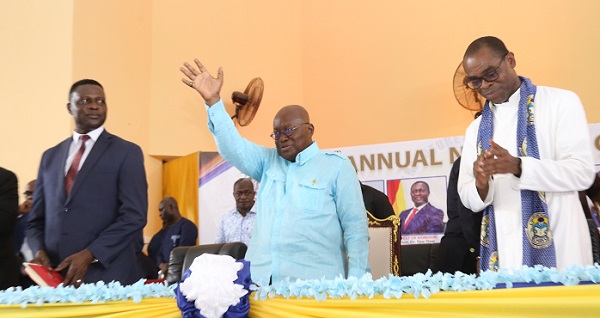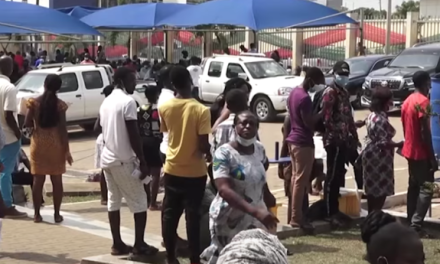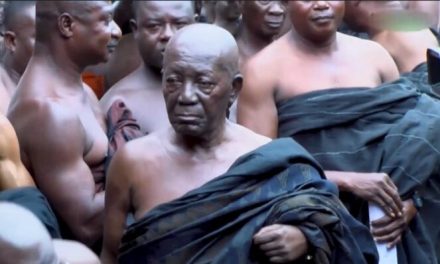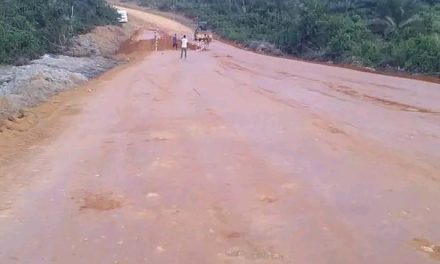
GH¢115bn Goes Into Education Since 2017: SHSs Take GHH₵12.96bn – Akufo Addo5 min read

Out of the amount, he said, GH¢12.96 billion had been spent on senior high schools.
“At the senior high school alone, of which there are 925 schools, we have initiated a total of 1,105 projects, including accommodation and teaching and learning related projects from 2017 to date,” President Akufo-Addo stated.
In an almost 40-minute speech at the 61st annual conference of the Heads of Assisted Secondary Schools (CHASS) at the Achimota School in Accra yesterday, President Akufo-Addo said “Out of this, 406 are classroom blocks of various types, science laboratories and home economic blocks, 386 dormitory blocks, 233 toilet facilities with nine newly constructed model STEM SHSs spread around the country.”
The President touted the achievements of his government in the education sector as unmatched.
He said no government in the history of the Fourth Republic had done more for the growth of the education sector than his government.
Supporting his assertion with figures, President Akufo-Addo said 280,000 laptops for teachers, 350 buses, 840 pick-up vehicles, 1,500 motorcycles and 667,470 pieces of furniture had also been distributed since 2017.
He further disclosed that 450,000 tablets, under the one-student, one-tablet policy, would also be distributed soon.
CHASS conference
The CHASS conference is an annual gathering of heads of assisted secondary schools where they take stock of their activities and stewardship in the past year.
President Akufo-Addo said together with members of CHASS, the government was shaping the future of education in Ghana for excellence and its outcomes.
That, he stated, was not just a project but a movement, a transformation and a promise for brighter digitally empowered tomorrow.
President Akufo-Addo expressed gratitude to all stakeholders, educators, parents and communities who had contributed to “this wonderful” journey, saying, “Together we are indeed shaping a brighter future for Ghana, where the people will witness a flurry of Ghanaian civilisation which will ensure that every Ghanaian child will have ready access to quality education comparable to anywhere in the world.”
Touching on the welfare of educators, President Akufo-Addo said educators would continue to be a priority for his government as it remained committed to its teacher first policy.
That would ensure that teachers, who the President described as “central to all our education reforms, were fully tooled, skilled and supported to deliver quality learning outcomes to support our development aspirations.”
Akufo-Addo graduates
Between 2013 and 2016, President Akufo-Addo said, “we had the unfortunate situation in our country where on the average 100,000 children every year passed the Basic Education Certificate Examination (BECE) but could not take up their places in SHSs because they could not afford the fees, even though they had the qualification.
He said if that situation had persisted for a decade, a million children would have dropped out of school at the junior high school (JHS) level.
He described that as an unacceptable outcome for any nation in the 21st century and said it would have been too dangerous for Ghana’s stability as they would have been building a future of hopelessness for our youth.
Such a situation, the President indicated, were intolerable and “my party and I were determined to end it.”
He said that was one of the reasons for the introduction of the Free SHS in September 2017.
Giving a background to the Free SHS policy, President Akufo-Addo said access under the policy had gone from a population of 830,000, when he took office, to 1.4 million today.
In effect, he said, “we have been able to catch and retain the annual 100,000 dropouts within the educational system, a situation, he said, was a commendable development for the nation and for the young people involved.
Furthermore, he said, the results of each batch of the graduates had surpassed those chalked up in 2016 prior to his assumption of office.
The President said in spite of the increased enrolment figures, quality had not declined but had on the contrary improved.
He, therefore, thanked members of CHASS for the impressive results in the WASSCE since the commencement of the Free SHS, pointing out that the 2022 WASSCE results of the third batch of the graduates showed 60.39 per cent students recording A1 to C6 in English as opposed to 31.6 per cent in 2016.
President Akufo-Addo said 62.45 per cent recorded A1 to C6 in Integrated Science in 2022, as opposed to 48.35 per cent in 2016, with the 2022 result being a slight regression from the 2021 pass rate of 65.7 per cent.
In Mathematics, he said 61.39 per cent recorded A1 to C6 as compared to 33.13 per cent in 2016 and 71.51 per cent recorded A1 to C6 in Social Studies as compared to 54.55 per cent in 2016,” he added, saying the 2022 results was the best in the last eight years.
Surely, there could no longer be any controversy about the validity of the Free SHS policy and its consequential measures, President Akufo-Addo stressed.
Digital Literacy Project
Giving details about the Digital Literacy Project at the SHS level, he said the E-Transform Ghana Project stood as a beacon of progress.
He said for the investment of $97 million, the government was enhancing service delivery through information and communications technology (ICT).
Among its many facets, the President said, the E-education components promised to establish computer laboratories in 305 senior high schools in all the regions of the country.
These laboratories, he explained, would be equipped with cutting edge technology fostering in the environment where students could immerse themselves in the digital row.
TVET
President Akufo-Addo also spoke about how the Technical Vocational Education Training (TVET) sector had witnessed a comprehensive modernisation and expansion and added that Science, Technology, Engineering and Mathematics (STEM) education had also become the cornerstone of progress and innovation in the modern world.


















